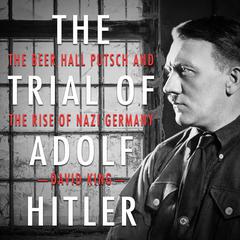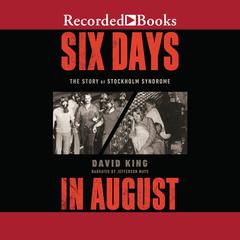 Play Audiobook Sample
Play Audiobook Sample
Vienna 1814: How the Conquerors of Napoleon Made Love, War, and Peace at the Congress of Vienna Audiobook
 Play Audiobook Sample
Play Audiobook Sample
Quick Stats About this Audiobook
Total Audiobook Chapters:
Longest Chapter Length:
Shortest Chapter Length:
Average Chapter Length:
Audiobooks by this Author:
Publisher Description
The Napoleonic Wars had torn Europe apart, and the peace conference of 1814 was to be held in the continent's grandest city: Vienna. Everyone had an agenda in the postwar world, and spy networks, bitter hatreds, illicit affairs, and tangled alliances ensued.
Despite the gravity of the situation, the Hapsburg Emperor of Austria, in opening his splendid rococo palace to the European royals and providing elaborate banquets and lavish entertainments, set the stage for the most extravagant pageantry since the fall of the Roman Empire. Guests were swept up in the dazzling whirlwind of social events—masquerades, hunts, and elaborate dinners—even as maps were being redrawn, rulers reinstated or ousted, and fortunes transferred. Ultimately, the Congress of Vienna ushered in the longest period of peace Europe has ever known. Vienna 1814 is a rich, impeccably researched history of the intrigue and frivolity that would forever mark the Congress of Vienna as the greatest Vanity Fair of all time.
Download and start listening now!
"This book starts very slow, with the admittedly required set-up of the characters. Metternich, Tallyrand, and the other key figures at the Congress of Vienna are placed in their historical context, and the reader gets a primer on each of their backgrounds and what makes each one tic. Next comes a section which makes a reader feel like he is reading Us Weekly, rather than a historical work, with details of sordid affairs, and other gossip that is seemingly unworthy of a serious look at one of the major events in world history. However, it becomes clear, as details of Tsar Alexander's ability to play on Metternich's heart strings by taking up with his former mistress, that these events really are key to the diplomatic maneuvering and posturing of the Congress. Davis demonstrates that the resulting peace was less an orchestrated agreement than a poor, nearly accidental compromise. The next step in this logic, which Davis never explicity lays out, is that the peace held more because Europe was so traumatized by war than because of the just peace that brought it to a close. Instead, Davis notes that the strong Prussia which emerged laid the seeds for the wars of the 20th century, and the failure to contain Russia and nix its ambitions in Southeast Europe (the Balkans and Turkish territories) sparked future struggles from the Crimean War to the Cold War."
— Bill (4 out of 5 stars)
Quotes
-
A sensuous account of the conference that moves gracefully between negotiating tables, salons and ballrooms.
— San Francisco Chronicle -
“A sensuous account of the conference that moves gracefully between negotiating tables, salons, and ballrooms.”
— San Francisco Chronicle -
“A worthy contribution to the study of a critical historical event long neglected by historians.”
— Library Journal (starred review) -
“Deftly paced and engagingly written.”
— Publishers Weekly
Vienna 1814 Listener Reviews
-
" A remarkable story of how all the rulers of Europe came together for 6 months or so to solve peace as we know it-and fail. Parties, intrigue, spying and Napolean escaping Elba. Fascinating. "
— Glenn, 2/1/2014 -
" A very good history of the Congress of Vienna. For those who are not history geeks, after the first defeat of Napoleon the winning powers (Great Britain, Russia, Austria, and Prussia were the main ones) met in Vienna to decide the fate of Europe. Such questions as should there be a Poland (no), what would happen to the Kingdom of Naples (it went back to the Bourbons). It is a very dry subject, but the author makes it very lively. It amazed me how much of the politics were conducted in lady's salons, and the amount of influence a few key ladies had over policy. Not a bad book, but I would recommend it to the true history geeks only. Definitely not a beach read. "
— Gouty, 1/24/2014 -
" A great book with insight into Vienna as the Europeans tried to figure out how to split up Europe but instead had a huge party. "
— Britaini, 1/16/2014 -
" Oh those nutty politicians. Lovers, not fighters. "
— Sue, 1/15/2014 -
" The most engrossing take on Metternich since Kissinger. Certainly an easier read than Kissinger's fifty-eight-year-old dissertation. Loads of colorful court intrigue to spice it up and make the diplomacy easier to swallow. Plus at the end there's a good old fashioned war! Highly recommended. "
— Kelly, 1/13/2014 -
" I learned more about some of the people that shaped today's Europe: Prince Metternich, Alexander 1st of Russia, Tallyrand, Napolean,etc, and how the boundaries of many of the European nations were established, that lasted until WWI "
— Gary, 12/13/2013 -
" okay, it's a trend. the prequel to Versailles. really good stuff. "
— David, 11/18/2013 -
" Interesting historical read but a bit like reading a textbook. Good but not great. I learned a lot about that period of European history. I liked how the author tied it in to what was happening in the US. "
— Sue, 11/16/2013 -
" Engrossing narration of the happenings at the Vienna Peace Conference, and what followed. "
— May, 4/25/2013 -
" Trying to read and understand Les Miserables brought me to Vienna 1814, and the lively, informative and amusing narrative of this book places it atop all other history books that I have read or studied. "
— Edward, 12/2/2011 -
" This is nonfiction but it reads like a historical novel. If you like historical books you'll love this. It's fun to see all the intrigue and craziness that went on at the Congress of Vienna while meanwhile Napoleon was planning his escape from Elba. It's really a great book. "
— Megan, 9/22/2010 -
" A surprisingly readable scholarly account of the Congress of Vienna. Just as entertaining as Harold Nicolson's slender volume, but with a great deal more research to assuage one's guilt. "
— Justin, 2/15/2010 -
" Intrigue and gossip. History and Political Science. The first Congress of its kind with ramifications that had an impact on WWI and thus the rest of Western history. Good read. "
— David, 1/16/2010 -
" I learned more about some of the people that shaped today's Europe: Prince Metternich, Alexander 1st of Russia, Tallyrand, Napolean,etc, and how the boundaries of many of the European nations were established, that lasted until WWI "
— Gary, 1/14/2010 -
" A great book with insight into Vienna as the Europeans tried to figure out how to split up Europe but instead had a huge party. "
— Britaini, 10/3/2009 -
" Trying to read and understand Les Miserables brought me to Vienna 1814, and the lively, informative and amusing narrative of this book places it atop all other history books that I have read or studied. "
— Edward, 8/17/2009 -
" okay, it's a trend. the prequel to Versailles. really good stuff. "
— David, 8/13/2009 -
" This is nonfiction but it reads like a historical novel. If you like historical books you'll love this. It's fun to see all the intrigue and craziness that went on at the Congress of Vienna while meanwhile Napoleon was planning his escape from Elba. It's really a great book. "
— Megan, 7/26/2009
About David King
David King is a Fulbright scholar with a master’s degree from Cambridge University, and the author of Finding Atlantis, which was a Main Selection of the Book of the Month Club and which has been translated into several languages. He lives in Lexington, Kentucky, with his wife and daughter.


























